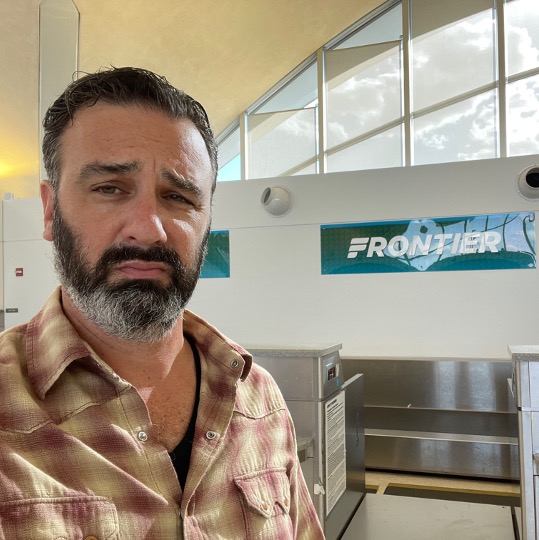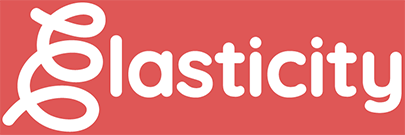I like to work with brands that I frequently use and enjoy. When we began working with Capital One and CafePress, I was thrilled because I was a frequent customer of each brand’s services and products. That’s why when I opened our office in Denver, I tried to connect with a number of senior marketing professionals at Frontier Airlines on LinkedIn who live in the area. Sure, none of them responded to me. But at least I tried.
Regardless, I am indeed a Frontier fan and a no-frills traveler who’d rather have lower-priced function than freemiums. But one thing I prize above all else in brands I invest in is attention to customer experience. Southwest Airlines, for example, may be a low-price carrier, but its end-to-end customer experience is generally exceptional.
Recently, I flew round-trip from St. Louis to Denver on Frontier. On the return trip to St. Louis, I was distracted by a remarkably-outfitted passenger as well as being half-asleep from the early flight time. I forgot my laptop in the seat sleeve in front of me (which really sucks any way you slice it). But the experience taught me about the minimal value Frontier places on customer experience.
I did not realize I’d left my computer on board until I drove to my office and opened my bag. Once I did, however, this was my subsequent journey:
- I began by searching Google for a local Frontier phone number at St. Louis International Airport. No dice. The only number I could find was for general customer service—both a toll free number and one with an 801-area-code (Utah). I called and the voice response unit hung up on me five times as they had no option which clearly met my needs.
- I then called again, deciding to go the route of pretending to book a flight so I could actually speak with someone. After providing a fake itinerary through the voice tools, they put me on hold to speak with a customer service agent. I waited….and waited. Unlike many airlines that will give you a sense of how long you might be on hold or offer to call you back, there was nothing.
- While waiting, I worked the digital tools—the Frontier app and web browser on my mobile phone. The app was filled with broken links—like reporting missing or lost luggage or items.
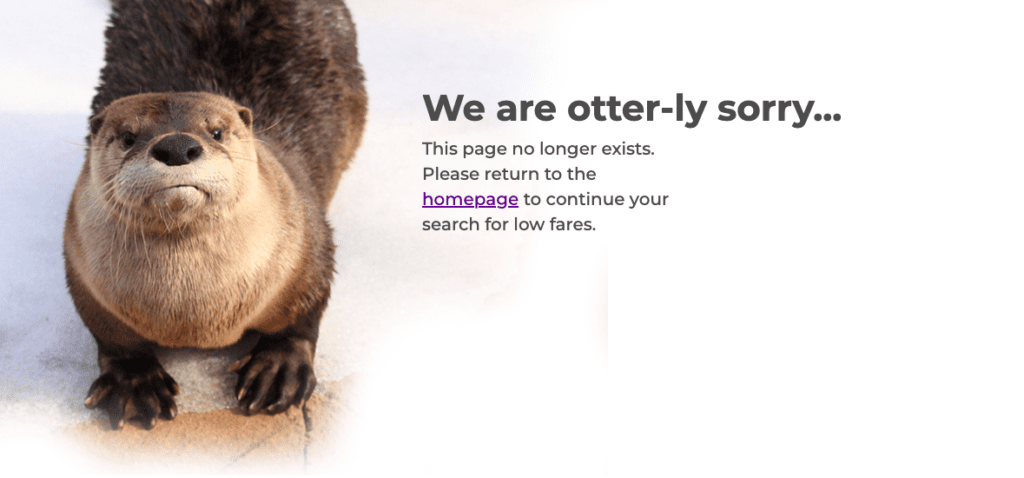
- The chat function does not work on the app either. The digital platforms commonly direct users to DM Frontier’s Facebook or Twitter for support as well. I did on Facebook and received no response. Twitter did not permit you to DM its account (as many brands do) whether or not you follow the airline’s account.
- I resorted to the chat function on the web browser. Once I got through the AI prompt, it took about 40 minutes for “Matt” to join the chat. When he did, Matt immediately disappeared for another five minutes. Once he rejoined, Matt asked if I’d called Frontier in St. Louis. I told him there was no way to call Frontier in St. Louis. He asked me to call the St. Louis International Airport. In short, he had no solutions from the airline for me—just passing the buck to the airport.
- I phoned the airport. After being passed around a few times, I finally found someone who would speak with me. She said there was no one in the airport from Frontier until 3:30pm (it was noon). I’d need to drive there at 3:30, go to the Frontier ticket counter and ask if they knew where it was (apparently Frontier has no baggage department at St. Louis Airport).
- I drove to the airport, arriving at 3:15 pm and waited. When 3:30 came and no one was there, I began to grow more anxious. I was subsequently joined in line by a few dozen Frontier customers looking to conduct business. I heard lots of grumbling. They all seemed frustrated and perplexed as to why no one was behind the ticket counter. Then 4pm came and still no one. After about an hour, at 4:12, four humans dressed in Frontier Airlines uniforms casually strolled behind the ticket counter.
- I learned they are not Frontier employees. They work for a contractor who supplies ticket counter employees to random airlines at the airport. The woman at the counter was completely confused as to why I had come to her. She said it very well may be back in Denver and told me to call the general customer service phone number. I told her I had done as much and been hung up on. She then handed me a piece of paper with the same 801 area code number on it with written instructions for what to say into the voice prompt. I asked her if there was a baggage department in Denver that I could call. After thinking about it for a few minutes, she came back with a hand-written phone number.
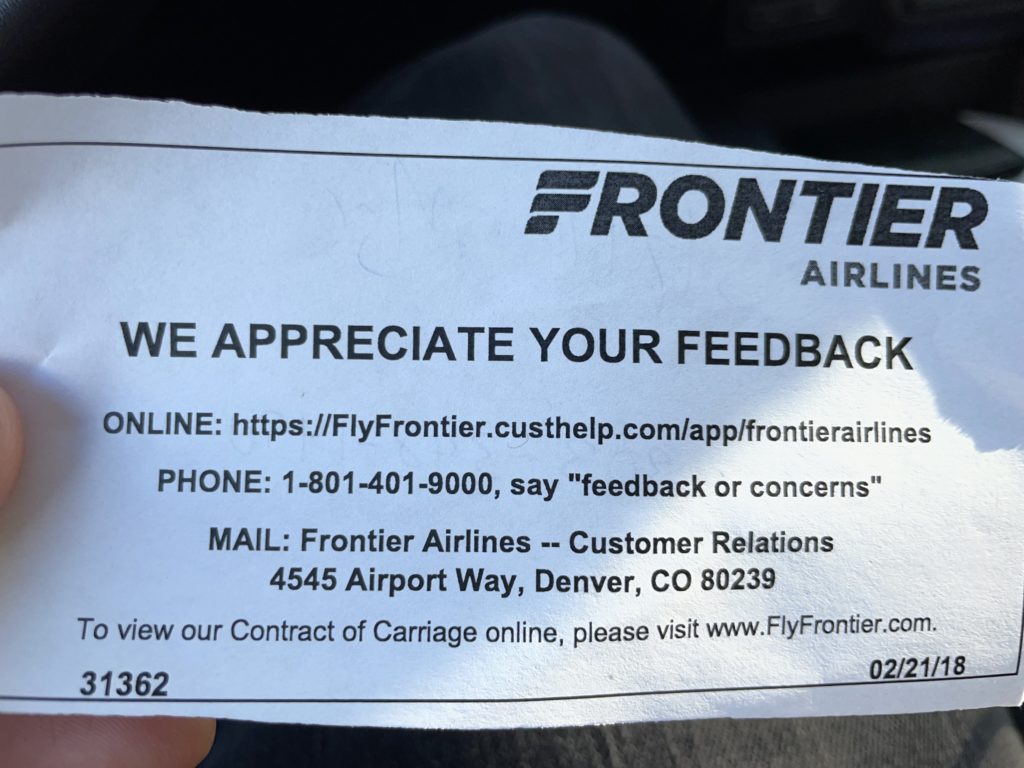
- I first called the phone number that was allegedly Frontier’s Denver baggage department. I dialed and it rang over and over and then went to a Verizon Wireless prompt telling me the party was unavailable and disconnected. I tried that about 10 times. About 12 hours later I learned the number was to a United Airlines baggage office in Denver—not Frontier.
- Then I called the customer service line from the instruction sheet. The first time, I waited on hold for eight minutes and 30 seconds. It literally played the following message on a loop for the entirety of the 8-plus minutes:
Don’t want to wait on hold? You can chat by visiting the contact us page on flyfrontier.com or, direct message on Facebook or Twitter.
- Been there, done that. So after hearing that message literally 58 times, I began longing for a hammer with which to smash my head, phone or both. Then the recording ceased and it seemed like the call was being answered. I was excited as at least that recording was ceased! I sat on the call in silence for two more minutes until it simply hung up on me. I called back and the second time and after nine minutes on hold—now listening to techno music—it finally worked. I got to a human being. America wins!
- After speaking with the phone agent for several minutes and her exploring what I needed to do, she redirected me back to the website and helped me navigate to an online claim form (that actually was not a dead link, like much of the airline’s website). She said there’s nothing she could do for me but that I needed to fill out this claim form. I did as much. Virtual pixels of gold arrived in my email inbox:
Dear Perlut (I liked the toughness of using just my last name),
Thank you for letting us know that you lost something important to you. We will do everything we can to help you find it. As a next step, we will search our inventory of items and email you if we find an item that closely matches your description. In that email, you’ll see a link which will guide you through the shipping and payment process so we can reunite you and your lost item as quickly as possible….
- Five days later, I received my first response from Frontier on Facebook. Let me repeat that — FIVE days later. This is social media which is entirely about immediacy. Then, however, about one hour after that, an email appeared saying the computer has been found.
- On October 19, I did, in fact, receive the machine. The heavens part!
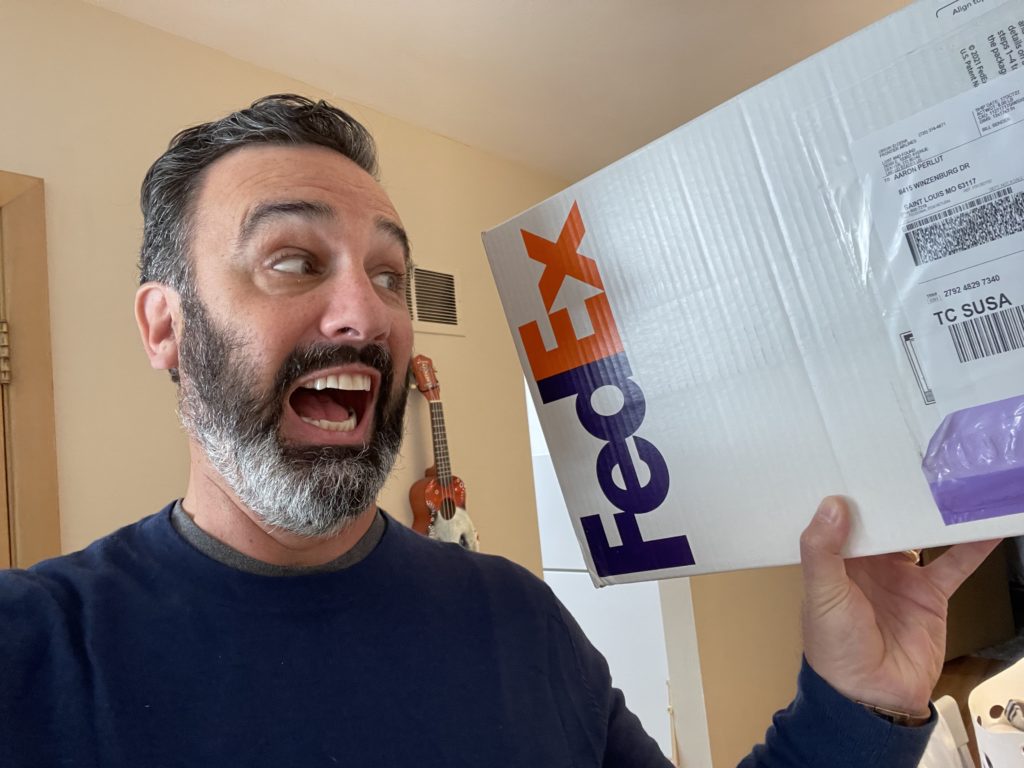
This all began, of course, with my own carelessness. There is no one to blame but myself and I feel foolish.
My ire, disappointment and annoyance, however, was with the lack of communication from a brand I am pre-conditioned to like, and one I truly enjoy and have often used. I’m a Den Club member, damn it! But ultimately, this episode made me not want to fly Frontier again, which is why customer experience is such an essential part of managing a brand’s health. And things may be on the downslope for Frontier’s customer service. On Thanksgiving, the airline announced it will do away with its customer call function.
Will I fly Frontier in the future? I’m certainly no longer a fan but am a no-frills traveler who’d rather have lower-priced function than freemiums. But who’s to say. After all, I’ve done dumber things—like leaving my computer on a plane.

